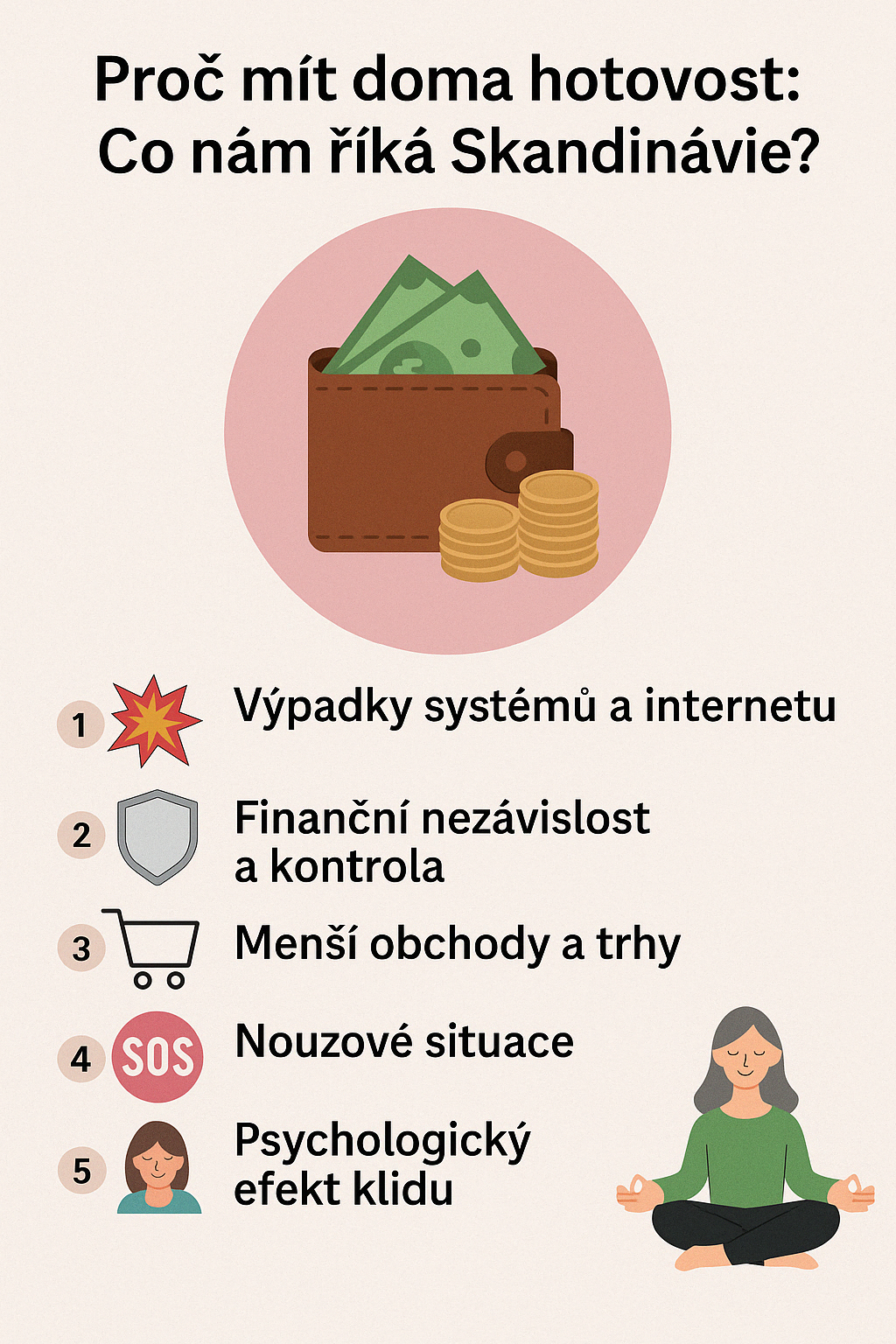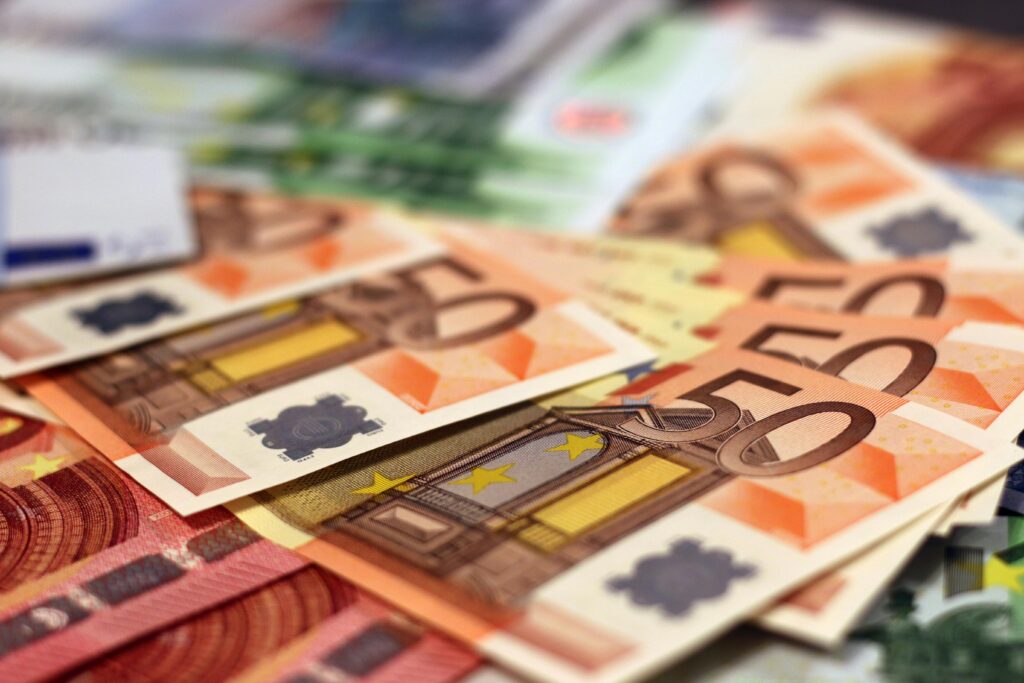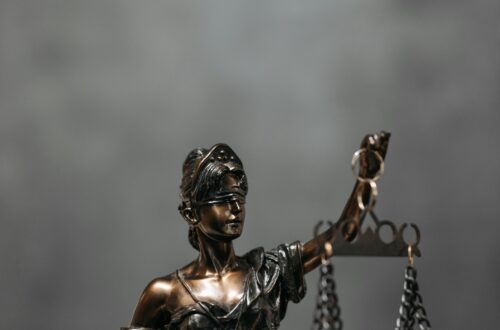
Why keep cash at home: What does Scandinavia tell us?
Why keep cash at home, even if you pay with your mobile phone? Get inspired by Sweden and Norway. 5 practical reasons that will convince you.
Dear ladies 50+, do you remember the times when we couldn't even do without cash? We always had a few hundred crowns in our wallet, change for the tram, a paper bill for lunch, and a few coins for a coffee with a friend. Then came payment cards, internet banking, and finally mobile phones that can even pay for a roll. It seems convenient - but is it also safe?
While we are getting used to the convenience of a cashless world, the most technologically advanced countries in Europe – Sweden and Norway – are surprising us: they are starting to recommend that people keep cash at home. Why? Because it was there that they realized that cash is not obsolete, but strategic.
Digital superpowers are reversing course
The Swedish government in its official brochure "Om krisen eller kriget kommer" recommends having cash at home – as part of crisis preparedness in case of digital system outages.
Sweden was on track to become the first completely cashless economy. But reality has brought cracks: power outages, hacker attacks, crises. So the Swedish Civil Defence officially recommends – keep at least a week's worth of cash at home.
Similarly, Norway. A country where you can't eat without a mobile app, has included physical money in its crisis management strategy. Not because it doesn't trust technology. But because it knows that in crisis situations, a card often turns into useless plastic.
Why such a turnaround? The answer is simple: security and self-sufficiency.
5 essential reasons to keep cash at home
1. Power outage = end of payments
All it takes is a strong storm or a technical problem and everything stops working – the internet, terminals, ATMs. What's left? Paper money. It doesn't need Wi-Fi or passwords.
"During the power outage in winter, we couldn't pay anywhere. Thanks to the 500 CZK in the envelope, we could at least buy food and water," recalls Eva (63) from the Krkonoše Mountains.
2. Cyberattacks are becoming more common
The Norwegian financial sector is intensifying defense against cyber attacks – warns against deepfake abuse, insider threats, and disruption of digital payment systems.
Hackers can cripple entire banking systems. A few clicks and your accounts are inaccessible. The money in your drawer remains yours, untouched and ready to use.
3. Cash protects privacy
Every digital payment leaves a trail. Where you've been, what you've bought, how much you've spent. And that information is sold on. Cash? That's silence. Discretion. Freedom.
4. Real control over expenses
Paper money is harder to let go of than a card chip. When you physically watch banknotes disappear from your wallet, you think more about what you buy. This is confirmed by psychologists.
5. Cash works always and everywhere
Whether you're at the market, at grandma's in the village, or in a mountain hut, cash is a universal language. Independent of technology, battery, or signal coverage.
How much cash is “just enough”?
According to the recommendations of the Nordic countries, it is reasonable to have at home an amount that covers the basic needs of the family for 3–7 days. In the Czech reality, this is approximately CZK 5,000 to 10,000 per person.
📌 Tip: Have banknotes in different denominations. A thousand-krona bill is difficult to change in a crisis. Hundred-crown and two-hundred-krona bills are more practical.
Where to store cash safely?
- Don't invest in a safe. – that's the first place a thief would look.
- Divide money into multiple places in the household.
- Be creative – a book, a flour jar, an old sweater in the closet.
- Tell only those closest to you.where you have cash – in case of emergency.
Modern times with a traditional fuse
This doesn't mean we should ditch credit cards and mobile banking - they provide the convenience we deserve. It's about finding a healthy balance. In today's digital age, cash acts as a safety net that you'll appreciate when modern systems fail.
Sweden and Norway show us that even the most advanced countries in the world recognize the importance of traditional solutions to ensure the security of their citizens. Perhaps we could take inspiration from them and add a little good old cash to our financial strategy.
What about you? Do you have a cash reserve at home? Or do you bet everything on a digital card? Tell us in the comments how you manage your financial security!
Final tip: Check and replenish your cash reserve regularly. Banknotes can become damaged by moisture or withdrawn from circulation, which you might not realize until you need them most.
When digital pioneers change direction
The situation in Sweden and Norway is a truly fascinating paradox. Countries that were at the forefront of the transition to a cashless society are now telling their citizens: “Don’t forget about paper money!” Sweden, where only 13% of transactions are made in cash, is now actively encouraging its citizens to keep a cash reserve at home.
It's as if the country that was building the fastest highways in the world suddenly started advising people to buy a bike just in case. And there's a logic to it!

Psychology and perception of money
Did you know that when we pay with cash, we tend to spend less? It’s not just a perception – psychological studies show that physically handing over money triggers a stronger “pain of loss” than an abstract electronic payment. When we see our stack of bills getting thinner, we are naturally more cautious.
This is also why financial advisors often recommend that people with spending problems switch to a cash budget temporarily.
Pandemic lesson
Covid-19 has brought about an interesting phenomenon: in some countries people have started to hoard cash out of fear of uncertainty, while in others they have avoided cash for hygiene reasons. The crisis has shown us how quickly our habits and preferences can change.
Swedish and Norwegian civil defense officials have likely been closely monitoring these trends and drawing conclusions from them for their new recommendations.
Payments for payments: When you have to pay with your own money
Typical fees that silently eat away at our savings:
- Account maintenance fees – we pay monthly just for having our own money stored somewhere
- Payment card fees – annual payments for a piece of plastic in your wallet
- ATM withdrawal fees – especially if we use a “foreign” ATM
- Transfer fees – some banks charge even for a simple transfer between accounts
- Hidden fees in courses – when making payments in foreign currency, we lose money at unfavorable exchange rates
With cash? No such fees! When you have a banknote in your wallet, no one charges you anything for "storing" it. It's simply yours.
Digital Eye: When Every Payment Leaves a Trace
Besides the financial costs, there is something much more valuable that we are losing – our privacy and freedom of choice.
Every cashless payment creates a digital record that reveals more about us than we may realize:
- Where and when do we shop?
- What are our consumption habits?
- What services do we use?
- How often do we go on vacation?
- How much do we spend on health, beauty or entertainment?
Digital consumer profile
This information is collected, analyzed, and used to create our consumer profile, which is then used by algorithms to “predict” our needs and try to influence our future purchases.
"When I started paying in cash at the pharmacy, I stopped getting targeted ads for arthritis medications," she says. "Before, I felt like marketing companies knew more about my health than my family."
Hidden costs for merchants = higher prices for everyone
Few people realize that we all pay for the convenience of card payments - even those who prefer cash.
Merchants must pay:
- Rental of payment terminals
- Transaction fees (usually 1-3% from each purchase)
- Costs of implementing new payment methods
- Electronic payment processing fees
These costs are logically reflected in the prices of goods and services. The result? Even if you pay in cash, you are also partly paying for those who use payment cards.
Swedish and Norwegian insights
Interestingly, it is in Scandinavia, where electronic payments dominate, that these economic aspects of cash are beginning to be recognized. In addition to security reasons, experts there also emphasize the economic independence that cash provides.
Norwegian economists point out that in the event of a crisis, electronic transaction fees may be increased, while the value of cash remains stable and independent of third-party decisions.
Cash as a protection for financial freedom
When we have part of our savings in cash:
- We are not fully dependent on the decisions of banks and payment companies
- We can avoid constantly increasing fees
- We protect your privacy and purchasing behavior data
- We have real control over your money
How to find a reasonable balance
This doesn't mean we should completely abandon credit cards or bank transfers. It's more about finding a reasonable balance:
- Regular small purchases – ideal for cash
- Online payments – it is difficult to do without electronic methods
- Savings for emergencies – part definitely in cash
- Travel – combination of cash and card as a deposit
“Money has never made anyone rich.” Lucius Annaeus Seneca – Roman philosopher, playwright, poet, and politician
“We admire the one who is indifferent to money the most.” Marcus Tullius Cicero – Roman orator, republican politician, philosopher and writer
“The best quality of money is its quantity.” Baruch Spinoza – Dutch Jewish philosopher
“Money is the god of our time, and Rothschild is its prophet.” Arthur Schopenhauer – German philosopher
“Money is a good servant, but a bad master.” Francis Bacon – English scientist, philosopher, and statesman
What to watch out for!
Remember that banks often offer “no-fee accounts” that actually come with many conditions and hidden costs. Always read the full price list and remember that even seemingly small fees can add up to surprising amounts over the course of a year.
As you can see, cash has a significant economic dimension beyond its security benefits. It is a symbol of true financial independence and protection from the increasing fees of the digital world. Perhaps that is why the pragmatic Nordic countries are starting to return to it again – and perhaps it is time for us to follow their wisdom.
And while you're here, read on:
👉 Procrastination & Co. – or how to masterfully put off the things you really need to do
👉 🧠 Confirmation bias – how to avoid being fooled by your own mind
And you? Are you actively tracking how much your digital banking is costing you? Share your experience in the comments!





[…] “long-term horizon”, how to choose ETFs and why you don’t need to know everything right away. In the meantime, try to think about why you should hold cash […]
[…] Documents and money: Personal documents, cash (in case of a failure of payment terminals, see the article about cash!). […]